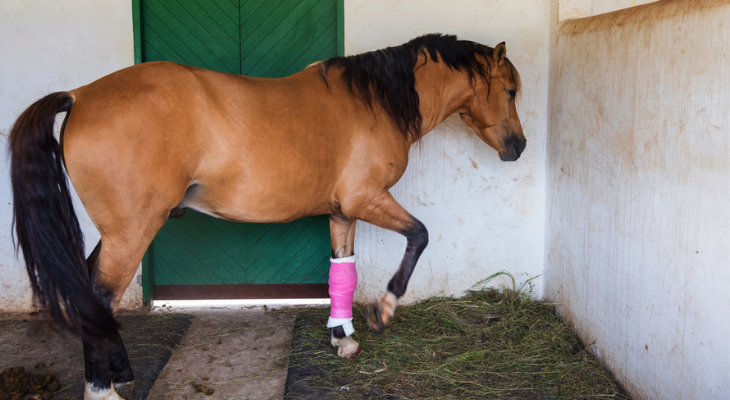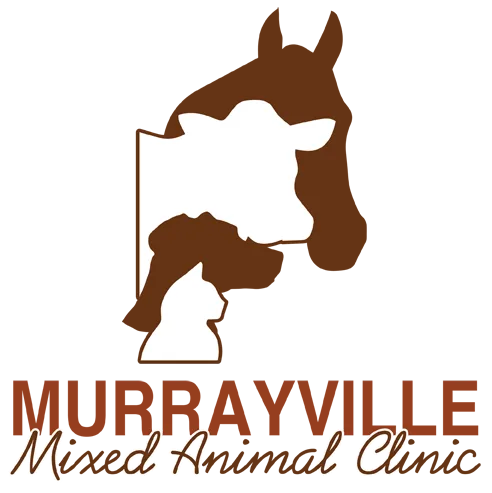
Keep Your Horse Safe from Worsening Tendon and Ligament Injuries
Even minor setbacks can add weeks or months to the recovery process after a tendon or ligament injury. Following these recommendations will help your horse avoid reinjuring or worsening its injury.
Treat Inflammation Immediately
Inflammation is helpful for healing in the short-term, but can cause increased pain and stiffness if it continues too long. Your horse may also be more likely to develop scar tissue in the ligament or tendon due to chronic inflammation. Scar tissue can also cause stiffness and worsen pain.
Use ice to decrease inflammation during the first few days after injury. Wraparound ice packs and cooling wraps fit around your horse's leg and help reduce swelling, inflammation, and heat. The American Association of Equine Practitioners recommends a 5-minute on/15 minute-off schedule for packs and wraps until swelling and heat subsides.
Nonsteroidal anti-inflammatory drugs (NSAIDs) will also reduce inflammation and swelling. Unfortunately, NSAlDs do have potential downsides. Because they're so effective in reducing pain, your horse may not eager to take it easy and could potentially reinjure the ligament or tendon. NSAIDs can also irritate your horse's stomach and cause ulcers. If you're thinking about giving your horse NSAIDs, ask your veterinarian how long to use the medication and which type is best for your horse.
Use a Compression Bandages
Wrapping a compression bandage around the injured leg can be helpful for both ligament and tendon injuries. Bandages decrease fluid build-up and offer support for the leg. The bandage should be tight enough to provide compression without cutting off circulation or causing discomfort. It's best to apply bandages when your horse is standing. Check the fit of the compression bandage every day and make adjustments if it becomes too loose.
Limit Your Horse's Activities
Although too much inactivity can increase stiffness, it's a good idea to offer a few days of stall rest after a tendon or ligament injury, according to Jan H. Spaas, Ph.D., D.V.M. He told The Horse that hand-walking, followed eventually by trotting and cantering, should start after a few days of rest.
Before moving on to trotting or cantering, Dr. Spaas recommends an ultrasound screening to ensure that the injured ligament or tendon is healing appropriately. If your horse has a severe injury, it may need more than a few days of rest before it begins exercising.
Consider Treatment Options
Many of the same treatments that help you recover from a sprain or tendon injury are also beneficial for your horse. Therapies that could help speed healing and relieve pain include:
- Ultrasound Therapy. Ultrasound waves heat deep tissues and reduce inflammation, pain, and muscle spasms. The therapy also promotes healing by improving blood flow.
- Laser Therapy. Laser therapy offers another treatment option. Heat generated by laser light reaches soft tissues where it eases pain, inflammation, and swelling.
- Platelet Rich Plasma (PRP) Therapy. PRP therapy involves drawing a small amount of your horse's blood, then spinning the blood in a centrifuge to concentrate the platelets. Platelets contain growth factors that help the body repair itself naturally. After the platelets are concentrated, they're injected into the injured area to stimulate healing.
- Extracorporeal Shockwave Therapy (ESWT). ESWT speeds healing and reduces the pain of tendon and ligament injuries. High-energy pulses from the shockwave device improve circulation, decrease pain, and trigger the generation of growth factor and new tissue.
- Stem Cell Therapy. One of the newest ways to treat ligament and tendon injuries, stem cell therapy uses cells taken from your horse's fat or bone marrow. Because stem cells can turn into many different types of cells once injected in the body, they offer an innovative way to treat injuries. This treatment reduces inflammation and repairs and rebuilds tendons and ligaments.
Need a little help managing your horse's tendon or ligament injury? Give us a call to schedule an appointment with the equine veterinarian.
Sources:
American Association of Equine Practitioners: Cold Therapy & Ice Bandages
https://aaep.org/issue/cold-therapy-ice-bandages
The Horse: Mending Equine Tendons and Ligaments, 6/22/2022
https://thehorse.com/110515/mending-equine-tendons-and-ligaments/
Texas A&M University School of Veterinary Medicine and Biomedicine Science: Texas A&M Lah Gives Long-Term Patient Hope Using Stem-Cell Therapy, 7/3/2020
Horse Illustrated: Managing Horses with Tendon and Ligament Issues, 5/31/2016
https://www.horseillustrated.com/horse-health-managing-horses-with-tendon-and-ligament-issues
Practical Horseman: Torn Horse Tendon: The Long Road Back from This Equine Injury, 9/24/2011
